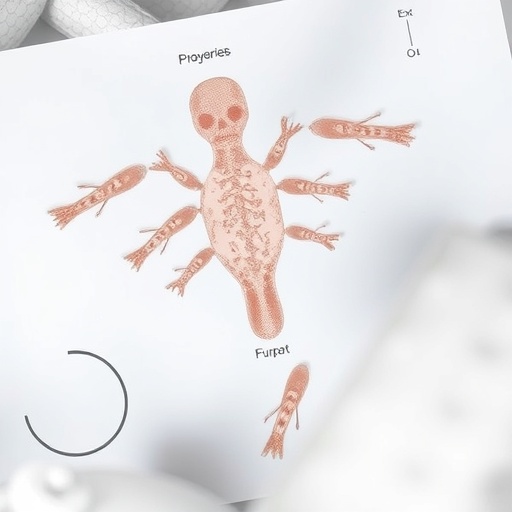In a groundbreaking study that plunges deep into the viral cosmos inhabiting the human gut, researchers have illuminated the hidden diversity and prevalence of temperate bacteriophages—viruses that infect bacteria and integrate their genomes into host cells. This intricate viral world, largely obscured until now, has profound implications for understanding gut ecology, microbial dynamics, and human health. By harnessing robust genomic tools, the team successfully mapped temperate phage genomes against the backdrop of the vast viral populations flourishing within the human digestive tract.
The human gut virome is a complex and dynamic ecosystem, its constituents shaping bacterial populations through predation, horizontal gene transfer, and modulation of host immunity. Temperate phages, distinguished by their ability to alternate between lysogenic and lytic lifestyles, play pivotal roles in maintaining homeostasis and influencing microbial evolution. However, their diversity and ecological significance have remained largely underexplored compared to their strictly lytic counterparts.
To address this knowledge gap, the researchers isolated and sequenced a diverse palette of inducible temperate phages from human gut bacterial isolates. By meticulously integrating these temperate phage genomes into a larger metagenomic framework, they compared their prevalence with well-characterized phage groups, including the enigmatic Crassvirales order—phages famously abundant in the human gut and identified only in the last decade.
Remarkably, about half of the newly catalogued temperate phage species were detectable in a comprehensive survey of over 1,200 human gut viromes, highlighting their widespread distribution. Among these, the LoVEphage—a novel Bacteroidota phage discovered recently—stood out as the most pervasive, identified in approximately 8% of analyzed viromes. Its dominance became even more striking in specific samples, where it constituted up to 64% of viral sequencing reads, underscoring its formidable presence in certain gut environments.
Comparisons with the Crassvirales order revealed thought-provoking contrasts. While Crassvirales phages, particularly those belonging to the alpha/gamma family, were present in nearly a fifth of the sampled viromes, the temperate phages affiliated with LoVEphage demonstrated a distinct yet complementary pattern of prevalence. This suggests complex ecological niches and viral-host dynamics fostering cohabitation and competition among different phage groups within the gut milieu.
Intriguingly, the study identified three phages closely related to LoVEphage at the species level, each induced from different bacterial hosts—Bacteroides thetaiotaomicron, Phocaeicola dorei, and Phocaeicola vulgatus. This cross-host presence reveals a fascinating facet of phage biology, suggesting the capacity of certain temperate phages to infect multiple bacterial species within the gut, potentially facilitating horizontal gene exchange and influencing microbial community structure.
Beyond LoVEphage, eight additional temperate phage species were detected in 2–5% of gut viromes. Among them were members of the enigmatic Hankyvirus genus, a Uetakevirus species targeting Escherichia coli, and several previously uncharacterized Bacteroidota phages named Wilby, Saffi, and Shia. These discoveries accentuate the rich and diverse repertoire of temperate phages coexisting with human gut bacteria, many of which have remained invisible to conventional analysis.
This comprehensive cataloging effort not only broadens our understanding of the gut virome’s composition but also sets the stage for investigating the functional ramifications of temperate phages in microbiome stability and host health. Temperate phages harbor unique genomic elements, including auxiliary metabolic genes and virulence factors, which can modulate bacterial hosts’ behavior and resilience, thereby influencing gut physiology and disease susceptibility.
Moreover, the capacity to isolate and characterize inducible temperate phages offers exciting avenues for phage therapy and microbiome engineering. As antibiotic resistance escalates, leveraging temperate phages to subtly manipulate bacterial populations presents a promising frontier. Understanding the infection dynamics, host specificity, and ecological roles of these phages is integral to developing precision interventions that reshape microbial communities without collateral disruption.
Importantly, the findings underscore the intricate ecological interplay between bacteria and their viral predators in the gut environment, where phages act as agents of genetic diversification, population control, and microbial communication. The differential abundance patterns of temperate phages compared to lytic viral lineages offer a nuanced picture of viral strategies employed to thrive alongside complex bacterial ecosystems.
The study employed cutting-edge metaviromic analyses, leveraging massive sequencing datasets from human gut samples worldwide to paint an unprecedented portrait of temperate phage ecology. This powerful synergy of isolation, genomic characterization, and population-level virome analyses exemplifies a holistic approach to understanding microbial viruses in situ.
As the investigation into gut temperate phages advances, future research will undoubtedly delve deeper into their interactions with host bacteria, their contributions to gut homeostasis, and their roles in disease processes. Revealing how environmental factors, diet, and host genetics influence temperate phage populations may unlock novel pathways for microbiota modulation and personalized medicine.
In essence, this research marks a transformative leap in gut microbiome science by spotlighting the vast, dynamic reservoir of temperate phages shaping human health. By coupling genomic innovation with ecological insight, it opens unprecedented vistas for harnessing the human virome—once a cryptic realm—for therapeutic and biotechnological breakthroughs poised to redefine our relationship with the microbial world within.
Subject of Research:
Isolation, genomic characterization, and ecological analysis of temperate bacteriophages in the human gut microbiome.
Article Title:
Isolation, engineering and ecology of temperate phages from the human gut.
Article References:
Dahlman, S., Avellaneda-Franco, L., Rutten, E.L. et al. Isolation, engineering and ecology of temperate phages from the human gut. Nature (2025). https://doi.org/10.1038/s41586-025-09614-7
Image Credits:
AI Generated




